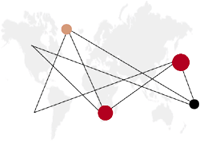
| PRESS | |
|
Conference on Redefining Higher Education in
Pakistan By Syed Babar Ali IN THE NAME OF ALLAH, MOST GRACIOUS, MOST MERCIFUL
We look forward to two days of intensive interaction and discussions to formulate strategies for the improvement of higher education in Pakistan. We are fortunate to have with us a galaxy of higher education experts from home and abroad to discuss the challenges and opportunities offered by higher education to revamp the system in Pakistan for greater common good. The Task Force on higher education in Developing countries, convened by the World Bank and the United Nations Educational, Scientific and Cultural Organization in 1997, comprised 16 members from 13 countries spread over five continents. The Task Force held intensive discussions and hearings over a two-year period to draw upon the knowledge and experience of higher education practitioners from around the world. The task Force Report entitled “ Higher Education in Developing Countries: Peril and Promise” was launched internationally in March 2000 in Washington, D.C. I, as a member of the Task Force, had provided copies of the report to the Vice-Chancellors/ Rectors of the Universities in Pakistan in May 200. The distinguished participants of the conference have already received copies of this Report. The main authors of the Task Force report are Professor Henry Rosovsky and Professor David Bloom. We will benefit from their wisdom and sagacity. Dr. Rosovsky is the former Dean of the faculty of Arts and Sciences and is Geyser University Professor Emeritus of Harvard University. He is the Co-chair of the Task Force. Dr. David E. Bloom is Professor of Harvard University and is Head of the Task Force Secretariat. I, as a member of the Task Force, am witness to their tenacity of purpose and clarity of approach. They will enlighten us on the salient features of the Task Force Report in the first session this morning and, through their presentations and ensuing discussion, will set the tone of this Conference. The second session today will deal with higher education in Pakistan and, besides an overview, is structured on the pattern of Task Force Report to deal with issues of public interest, governance, science and technology, information technology, and general and liberal education. The last session today will deal with comparative issues and we will hear from the distinguished participants from Bangladesh and India to give a regional perspective to our discussion on higher education. Sessions tomorrow will successively deal with role of higher education in societal transformation, governance and management of higher education, raising quality of teaching and research, and financial sustainability of higher education institutions in order to guide us towards strategy formulation and implementation. The Task Force has diagnosed specific problems of higher education that are common across the developing world and has suggested potential solutions. We need to formulate and implement strategies for the improvement of higher education in Pakistan. This is the objective of this Conference. We are grateful to the World Bank for having sponsored participation of our distinguished guests from Bangladesh and India. We are deeply indebted to the participants of the Conference from all over the Pakistan The representatives of the various international organizations in Pakistan have honoured us by their presence. I am thankful to my colleagues for making arrangements for holding the Conference. It is sincerely hoped that our distinguished guests will bear with us for any lapses on our part. I wish you all very productive two-days of interaction. May I now request Prof. Henry Rosovsky to enlighten
us. The Task Force sounds an alarm that higher education in developing countries is in crisis: it is generally overcrowded, chronically under-funded, poorly managed, and beset with inadequate faculty and curricula. The report underscores the need for a holistic approach to education policy, emphasizing that poor countries should view higher education as a vital part of their overall human development strategy. It argues that advanced education is crucial for developing countries if they hope to engender the capacity required to overcome serious problems, such as hunger, persistent poverty, environmental degradation, and economic under-performance. Demand for higher education is rising rapidly, compounding the challenges for countries that hope to improve quality, reduce public cost, and increase access to all strata. The Task Force report advocates a policy of systemic reform emphasizing planned diversity, where both public and private actors co-ordinate their actions within a clear strategic framework. Mamphela Ramphele, incoming World Bank Managing Director for Human Development, Task Force Co-Chair, and Vice Chancellor of the University of Cape Town, South Africa expressed her belief that higher education is important to poverty reduction: ‘There is no way we can succeed in the eradication of poverty if the developing world is not a part of knowledge creation, its dissemination and utilization to promote innovation. Higher education is a critical factor in making this possible and must be part of any development strategy.’ To learn more about the World Bank’s Human Development Week, visit http://www.worldbank.org/
Andrew Kircher |